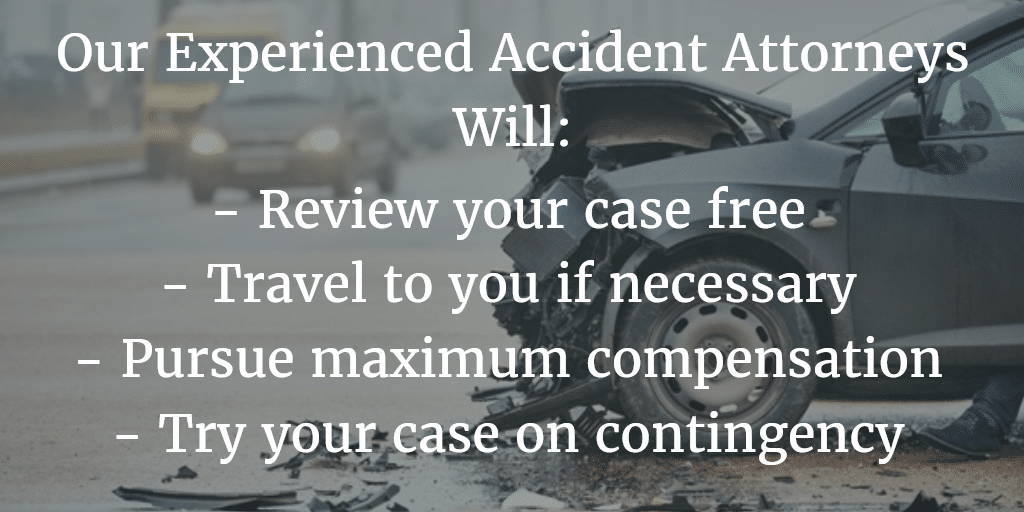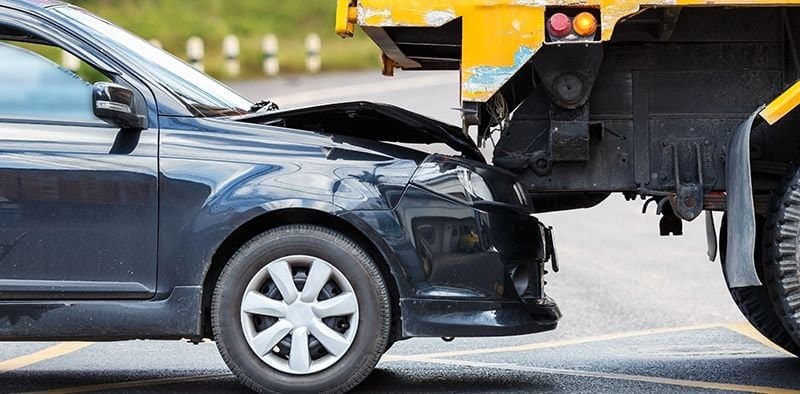Vehicle Collision Lawyers Serving Missouri & Illinois
The immediate moments following an accident can be filled with fear, pain, and confusion. In the days and weeks following your crash, you may face debilitating injuries, mounting medical bills and time away from work that you and your family can not afford. These difficult situations can be financially crippling and emotionally draining.
Fortunately, you don’t have to go through this alone. Our experienced accident attorneys have successfully represented hundreds of motor vehicle accident victims and we are dedicated to helping you get the compensation you need to heal and get back on track.
If you or a loved one has been harmed in a collision with a motor vehicle, it’s important that you contact Brown & Brown, LLP right away to discuss your case for free. With two offices, we proudly serve the St. Louis area of Missouri and Illinois. If you can’t come to us, we’ll come to you.
Dial 3s to reach us in Missouri: 314-333-3333 or 573-333-3333. Dial 8s for service in Illinois: 618-888-8888. Brown & Brown proudly serves the Greater St. Louis area and all surrounding Missouri and Illinois communities. Call us today to set up your obligation and cost-free case review to learn how we can help you get the justice you are due.

Our Areas of Motor Vehicle Accident Representation
Leading Causes of Motor Vehicle Accidents
Motor vehicle accidents are most often caused by driver negligence. This may include:
- Speeding and aggressive driving
- Drug and alcohol use
- Driver distraction
- Fatigue and drowsy driving
- Generally reckless behavior
In these cases, there is often a clearly negligent party, but this is not always true. When you are injured in a motor vehicle accident, you need an attorney on your side who can reconstruct the accident, look at it from multiple angles, and establish exactly who is liable for your injuries.
In addition to driver-caused motor vehicle accidents, there are external factors that may contribute to injurious crashes. These include poorly designed roadways, inadequate road maintenance, obscured or missing traffic signs, and faulty or defective vehicles. As with driver-caused accidents, the true cause of these motor vehicle crashes is not always immediately clear. Our lawyers are here to investigate every aspect of your accident to properly identify all liable parties, and to take that information as far as needed to help you secure maximum compensation.
Marijuana and Car Accidents
With the decriminalization and legalization of marijuana, there has been an increase in the number of accidents involving drivers intoxicated by THC. It is important to remember that, even in cases where marijuana is used medically, THC has a profound impact on driving ability. As with alcohol, it is best to avoid driving if you have smoked, eaten, or otherwise taken a product containing THC.
Is Marijuana Allowed on Busses, Trains, and Other Modes of Public Transportation?
No smoking of any kind is allowed on buses. This complies with federal transporation regulations. Smoking, including marijuana, which is listed as a drug in Schedule I of the Controlled Substances Act, should not be smoked while on any mode of public transportation.
Driving Under the Influence
“Driving under the influence” or “DUI” is a term that refers to the offense of driving, operating, or controlling a vehicle while intoxicated by the effects of alcohol or drugs. Driving under the influence is incredibly dangerous as it typically renders the driver incapable of thinking clearly, making rational decisions, and responsibly being in control of a vehicle.
Driving under the influence not only causes car accidents that can lead to costly repairs, but it can also cause severe injuries such as paralysis, disfigurement, and brain damage. Driving under the influence is a crime, and in its worst-case scenario, it can lead to life-altering consequences or fatal accidents.
Driving Under the Influence of Alcohol (Drunk Driving)
Drunk driving, or driving under the influence of alcohol, is illegal. As the effects of alcohol can impair your judgment, it is extremely dangerous to drive while drunk. Operating a vehicle with a blood alcohol content of at least 0.08% will be considered driving under the influence and can result in jail time in the state of Colorado. Despite this percentage, driving under the influence of any amount of alcohol can still place drivers and pedestrians in dangerous situations.
Driving Under the Influence of Drugs
Smoking and then operating a vehicle is considered driving under the influence of drugs. This can be just as dangerous as driving while under the influence of alcohol. Any type of drug that can affect your perception, ability to think clearly, affect your balance, coordination, and other decision-making skills is the cause of unsafe driving. In the state of Colorado, driving under the influence of drugs is a crime punishable by license revocation or jail time.

Common Motor Vehicle Accident Injuries
The most common injuries sustained in motor vehicle accidents are:
- Head and brain injury
- Neck and spinal cord injury
- Broken, crushed, or fractured bones
- Lacerations and disfigurement
- Internal organ damage
- Injury to joints and ligaments
Some of these injuries may result in a loss of physical ability. Some may have lasting cognitive, memory and emotional consequences. Many of them will require both emergency and on-going medical intervention, make working impossible – at least for a time – and result in serious physical and emotional suffering. These damages must be taken into account if you are to receive fair compensation.
It is important to remember that insurance companies are for-profit corporations that aim to maximize profits in order to keep their stakeholders and board members happy. Record-breaking profits aren’t possible if they are providing fair payment for serious injury. Without an attorney on your side, it is unlikely that you will see even a fraction of what you are due. Call us today for a free consultation to learn how we can help you get more.
Can Car Accidents Be Prevented?
While accidents are unpredictable, there are several actions that drivers can take to prevent car accidents while they are in control of their vehicle. Road safety can go along way when it comes to preventing accidents between you and others on the road. Some safety strategies can include the following:
- Always drive within the speed limit.
- Avoid distractions while driving.
- Do not text and drive.
- Avoid eating while driving.
- During inclement weather, be cautious, and drive defensively.
- Never drink and drive.
- Never do drugs or smoke before operating a vehicle.
- Do not run stop signs or red lights.
- Obey traffic laws.
- Avoid driving at night.
- Take rest stops if you are feeling sleepy while driving.
- Switch drivers if needed.
- Ensure you know which phone numbers (local police stations, insurance) you can call if you are involved in a car accident.
Preventing Car Accidents As a Pedestrian
Pedestrians can also take precautions to help prevent car accidents. These precautions include:
- Obeying walking signs and signals.
- Always using the crosswalk.
- Avoid jaywalking.
- Walk on sidewalks whenever they are available.
- If there is no sidewalk, walk facing traffic and as far from traffic as possible.
- Cross streets at crosswalks or intersections.
- Avoid looking down and using your phone while walking.
- Avoid wearing headphones while walking.
- Remain aware of your surroundings.
- Make eye contact with the driver before crossing a street.
- Avoid walking in the dark or at night. If you have to walk in the dark, wear light clothing that makes you easily visible.
Determining What a Motor Vehicle Accident is Worth

So many things go into determining the worth of a case. If you have been injured in a motor vehicle accident, the best thing you can do is consult with one of our attorneys. This visit is free of cost and you are under no obligation to work with us, even after your consultation.
When you reach out to Brown & Brown, you and your family will have dedicated support on your side. Our accident lawyers have access to a breadth of legal resources to help ensure that the negligent parties responsible for your injuries are held accountable.
During the course of your case, we will investigate every avenue for maximizing the compensation to which you may be entitled, such as:
- Medical costs
- Loss of income
- Property damage
- Pain and suffering
- Mental anguish and emotional distress
- End of life expenses
A serious motor vehicle accident injury is life-altering. If your accident was caused by someone else’s recklessness or negligence, we can help to determine the true value of your injury claim, and hold the other driver responsible for turning your life upside down.
Read what our patients are saying!
"I was involved in an accident. I called Brown & Brown because I was worried about if I could handle the situation. They instructed me on the right things to do; they took care of everything. I was paid, the bills were paid, and my car was fixed. I recommend Brown & Brown to anyone."
Contact Our Accident Attorneys Today For a Free Case Review
Brown & Brown is here to protect your rights and to fight for the compensation you are due. To learn more about your legal options following injury in a motor vehicle accident, please call us today at 314-333-3333 or 573-333-3333 in Missouri, or 618-888-8888 to contact attorney Dan Brown today. We serve clients throughout areas of St. Louis, Missouri and Illinois. If your injury or situation prevents you from being able to visit one of our offices, our attorneys can come to you.


